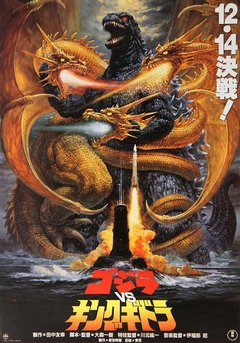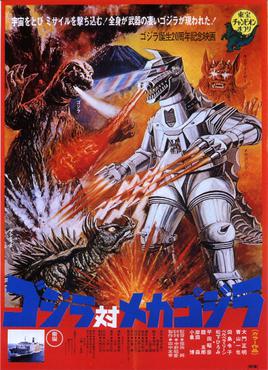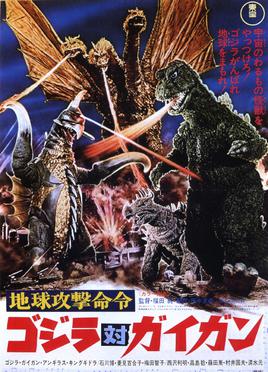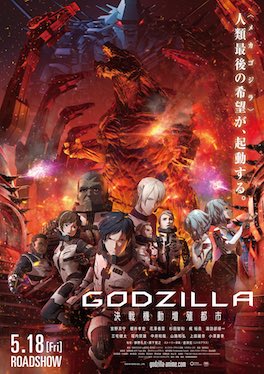
Terror of Mechagodzilla is a 1975 Japanese kaiju film directed by Ishirō Honda, written by Yukiko Takayama, and produced by Tomoyuki Tanaka and Henry G. Saperstein, with special effects by Teruyoshi Nakano. Distributed by Toho and produced under their effects subsidiary Toho–Eizo, it is the 15th film in the Godzilla franchise, serving as a direct sequel to the 1974 film Godzilla vs. Mechagodzilla, the final film in the initial Showa Era of the franchise before Godzilla returned nine years later in The Return of Godzilla, directed by Ishirō Honda and scored by Akira Ifukube before their deaths.

Godzilla vs. King Ghidorah is a 1991 Japanese kaiju film written and directed by Kazuki Ōmori and produced by Shōgo Tomiyama. Distributed by Toho and produced under their subsidiary Toho Pictures, it is the 18th film in the Godzilla franchise, and is the third film in the franchise's Heisei period. The film features the fictional monster characters Godzilla and King Ghidorah, and stars Kōsuke Toyohara, Anna Nakagawa, Megumi Odaka, Katsuhiko Sasaki, Akiji Kobayashi, Yoshio Tsuchiya, and Robert Scott Field. The plot revolves around time-travelers from the future who convince Japan to travel back in time to prevent Godzilla's mutation, only to reveal their true motives by unleashing King Ghidorah onto the nation.

Rodan is a fictional monster, or kaiju, which first appeared as the title character in Ishirō Honda's 1956 film Rodan, produced and distributed by Toho. Following its debut standalone appearance, Rodan went on to be featured in numerous entries in the Godzilla franchise, including Ghidorah, the Three-Headed Monster, Invasion of Astro-Monster, Destroy All Monsters, Godzilla vs. Mechagodzilla II and Godzilla: Final Wars, as well as in the Legendary Pictures-produced film Godzilla: King of the Monsters.

King Ghidorah is a fictional monster, or kaiju, which first appeared in Ishirō Honda's 1964 film Ghidorah, the Three-Headed Monster. The monster was initially created by Tomoyuki Tanaka, Eiji Tsuburaya and Shinichi Sekizawa as an homage to the eight-headed mythological Japanese dragon Yamata no Orochi. Although the name of the character is officially trademarked by Toho as "King Ghidorah", the character was originally referred to as Ghidorah, Ghidrah or Monster Zero in some English markets.

Godzilla vs. Mechagodzilla is a 1974 Japanese action-adventure kaiju film directed by Jun Fukuda, with special effects by Teruyoshi Nakano. Distributed by Toho and produced under their effects subsidiary Toho–Eizo, it is the 14th film of the Godzilla franchise, and features the fictional monster characters Godzilla, Anguirus, and King Caesar, along with the mecha character Mechagodzilla. The film stars Masaaki Daimon, Kazuya Aoyama, Gorō Mutsumi, and Akihiko Hirata, with Isao Zushi as Godzilla, Satoru Kuzumi as both Anguirus and King Caesar, and Kazunari Mori as Mechagodzilla. The film marks the first appearances of King Caesar and Mechagodzilla in the franchise.

Godzilla vs. Gigan, is a 1972 Japanese kaiju film directed by Jun Fukuda, written by Shinichi Sekizawa, and produced by Tomoyuki Tanaka, with special effects by Teruyoshi Nakano. Distributed by Toho and produced under their effects-based subsidiary Toho-Eizo, it is the 12th film in the Godzilla franchise, and features the fictional monster characters Godzilla, Gigan, Anguirus, and King Ghidorah. The film stars Hiroshi Ishikawa, Yuriko Hishimi, Tomoko Umeda, and Minoru Takashima, alongside Haruo Nakajima as Godzilla, Kenpachiro Satsuma as Gigan, Koetsu Omiya as Anguirus, and Kanta Ina as King Ghidorah. It is the last film in which Godzilla was portrayed by Nakajima after playing the character since the original 1954 film; he subsequently retired from suit acting.

Godzilla vs. Mechagodzilla II, is a 1993 Japanese kaiju film directed by Takao Okawara, with special effects by Kōichi Kawakita. Distributed by Toho and produced under their subsidiary Toho Pictures, it is the 20th film in the Godzilla franchise, as well as the fifth film to be released during the franchise's Heisei era. The film features the fictional monster character Godzilla, along with Baby Godzilla and the mecha character Mechagodzilla. Despite its English title, the film is not a sequel to the 1974 film Godzilla vs. Mechagodzilla.

Mechagodzilla is a fictional mecha character that first appeared in the 1974 film Godzilla vs. Mechagodzilla. In its debut appearance, Mechagodzilla is depicted as an extraterrestrial villain that confronts Godzilla. In subsequent iterations, Mechagodzilla is usually depicted as a man-made weapon designed to defend Japan against Godzilla and other kaiju. In all incarnations, the character is portrayed as a robotic doppelgänger with a vast array of weaponry, and along with King Ghidorah, is commonly considered to be an archenemy of Godzilla.

Godzilla Against Mechagodzilla is a 2002 Japanese kaiju film directed by Masaaki Tezuka, with special effects by Yūichi Kikuchi. Distributed by Toho and produced under their subsidiary Toho Pictures, it is the 27th film in the Godzilla franchise and the fourth film in the franchise's Millennium period, and is also the 26th Godzilla film produced by Toho. The film features the fictional giant monster character Godzilla, along with an updated version of the mecha character Mechagodzilla, who is referred to in the film as Kiryu. The film stars Yumiko Shaku, Shin Takuma, Kou Takasugi, Yuusuke Tomoi, Kumi Mizuno, and Akira Nakao, with Tsutomu Kitagawa as Godzilla and Hirofumi Ishigaki as Kiryu.

Bear McCreary is an American musician and composer of film, television, and video game scores based in Los Angeles, California. His work includes the scores of the television series Battlestar Galactica (2004), Agents of S.H.I.E.L.D., Black Sails, Outlander, The Walking Dead, The Lord of the Rings: The Rings of Power, The Serpent Queen, Percy Jackson and the Olympians, Halo, the video games Call of Duty: Vanguard, God of War and God of War Ragnarök, and the film Godzilla: King of the Monsters.

Godzilla is a Japanese monster, or kaiju, media franchise consisting of films, television series, novels, comic books, video games, and other merchandise. The franchise is centered on the fictional kaiju Godzilla, a prehistoric reptilian monster awakened and powered by nuclear radiation. The franchise is recognized by the Guinness World Records as the "longest continuously running film franchise", having been in ongoing production since 1954, with several hiatuses of varying lengths. The film franchise consists of 38 films: 33 Japanese films produced and distributed by Toho Co., Ltd.; and five American films, the first of which was produced by TriStar Pictures and the remaining four by Legendary Pictures, with the latest being released in March 2024.
As an enduring and iconic symbol of post-World War II cinematic history, the fictional giant monster Godzilla has been referenced and parodied numerous times in popular culture. Godzilla and other atomic monsters have appeared in a variety of mediums, including cartoons, film, literature, television, and video games.

The Monsterverse is an American multimedia franchise and shared universe featuring Godzilla and other sister characters owned and created by Toho Co., Ltd, as well as King Kong. The franchise consists of five films and two television series that have been produced by Legendary Pictures, with Warner Bros. Pictures distributing the films and the series being released for streaming on Netflix and Apple TV+. The franchise has received a generally positive critical reception and has grossed $2.316 billion worldwide at the box office.

Godzilla: King of the Monsters is a 2019 American monster film directed and co-written by Michael Dougherty. Produced by Legendary Pictures and distributed by Warner Bros. Pictures, it is a sequel to Godzilla (2014) and the third film in the MonsterVerse. It is also the 35th film in the Godzilla franchise, and the third Godzilla film to be completely produced by a Hollywood studio. The film stars Kyle Chandler, Vera Farmiga, Millie Bobby Brown, Bradley Whitford, Sally Hawkins, Charles Dance, Thomas Middleditch, Aisha Hinds, O'Shea Jackson Jr., David Strathairn, Ken Watanabe, and Zhang Ziyi. In the film, eco-terrorists release King Ghidorah, who awakens other monsters known as "Titans" across the world, forcing Godzilla and Mothra to surface and engage Ghidorah and Rodan in a decisive battle.

Godzilla: City on the Edge of Battle is a 2018 Japanese computer-animated kaiju film directed by Kōbun Shizuno and Hiroyuki Seshita. Produced by Toho Animation and Polygon Pictures, in association with Netflix, it is the 33rd film in the Godzilla franchise, the 31st Godzilla film produced by Toho, the second entry in the franchise's anime trilogy, and the third film in the franchise's Reiwa period.

Godzilla: The Planet Eater is a 2018 Japanese computer-animated kaiju film directed by Kōbun Shizuno and Hiroyuki Seshita. Produced and animated by Toho Animation and Polygon Pictures, in association with Netflix, it is the 34th film in the Godzilla franchise, the 32nd Godzilla film produced by Toho, the final film in the franchise's anime trilogy, and the fourth film in the franchise's Reiwa era.

Godzilla vs. Kong is the soundtrack to the 2021 American monster film Godzilla vs. Kong. A sequel to Kong: Skull Island (2017) and Godzilla: King of the Monsters (2019), it is the fourth film in Legendary's MonsterVerse, the 36th film in the Godzilla franchise, the 12th film in the King Kong franchise, and the fourth Godzilla film to be completely produced by a Hollywood studio. Directed by Adam Wingard, the film features musical score written and composed by Tom Holkenborg, the fourth film composer to work on the MonsterVerse franchise. He was announced as a part of the film in June 2020, before a planned meeting with Wingard, two years, expressing his interest on working on the score due to his personal love for the Godzilla film series during his teen years. The recording of the score took place for nearly two years, and was bundled into a soundtrack album, released by WaterTower Music in digital and physical formats on March 31, 2021, coinciding with the film's United States theatrical release.

Godzilla: King of the Monsters is the soundtrack to the 2019 American monster film Godzilla: King of the Monsters. A sequel to Godzilla (2014), it is the 35th film in the Godzilla franchise, the third film in Legendary's MonsterVerse, and the third Godzilla film to be completely produced by a Hollywood studio. Directed and co-written by Michael Dougherty, the film's musical score is composed by Bear McCreary, the third film composer to work on the MonsterVerse franchise. His involvement in the film was confirmed in July 2018, and recording of the musical score began later that year in Hong Kong. Several themes from Akira Ifukube's musical score for Godzilla (1954), were incorporated and sampled in the score. The album and score influenced a mix of electronic, trance and orchestral music with Japanese music for few of the themes. The soundtrack was released by WaterTower Music on May 24, 2019, a week before the film's theatrical release date. A limited edition triple LP soundtrack was released by Waxwork Records on July 5.

Godzilla: Original Motion Picture Soundtrack is the soundtrack to the 2014 American monster film Godzilla, which is a reboot of Toho's Godzilla franchise and also being the 30th film in that franchise. It is also the first film in Legendary's MonsterVerse and the second Godzilla film to be completely produced by a Hollywood studio. The score was composed and conducted by Alexandre Desplat, being the first film composer to work on the MonsterVerse franchise. The film score was released digitally by WaterTower Music on May 13, 2014, and a separate vinyl album was launched on June 17.

















